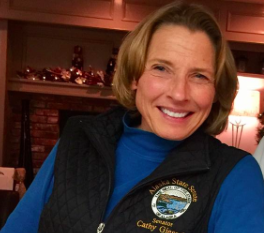By SEN. CATHY GIESSEL
When the environmental lawsuit industry is hopping mad about something, chances are news is good. Last week’s news is a perfect example.
Ryan Zinke, a former U.S. Navy Seal who also happens to be the U.S. secretary of the interior, looked at America’s offshore potential for oil and gas.
The Obama administration, which broke records for cranking out job-choking regulations, took 94 percent of possible offshore development completely off the table.
Secretary Zinke recognized this was unreasonable. Now, 90 percent of the offshore areas will be open for lease sales and development. That’s good and overdue. Folks who find and pump the energy that fuels our homes, businesses, and towns have had a target on their back for over a decade. When projects did not die by a thousand cuts in permitting, injunctions backed by money from the green lobby were ready to kill them in court.
Make no mistake: This was a war on families, businesses and jobs. Thankfully, the results of the presidential election last year are bearing fruit. The 1002 area of ANWR, a landmass smaller than some of our country’s airports, will finally open for exploration. President Obama tried to turn the National Petroleum Reserve-Alaska into a park; last month was the largest lease sale on North Slope federal lands in years.
Drilling opponents make wild claims trying to spin these reforms. Their reasons are all erratic and delusional, because they miss a key, inescapable truth: Demand for oil and gas isn’t going anywhere in our lifetimes.

Sure, there will be more windmills and solar panels, even batteries. But let me be clear: Our society runs on baseload energy – the stuff that must be available when you literally flip a switch – and renewables aren’t in that league. Natural gas and oil will remain the base of our civilization’s pyramid. We ignore that at our peril.
If we need something vital to keep our country working, we should never be held hostage to have it. But dictatorships in Venezuela, the Middle East, and elsewhere constantly try to leverage us, because they have what we need: energy. That’s ironic because we need something that’s in abundance within our own borders. OPEC, the oil cartel, tried to choke out our economy in the 1970s by creating an oil shortage. Thankfully, we responded by building the Trans-Alaska Pipeline System, and we put 17 billion barrels through that engineering marvel. It’s past time we return to that mindset.
“What about climate change and the environment?” If we care about the environment, let’s deal with the real cause of pollution: poverty. When was poverty ever good for the environment? When hundreds of millions of people in poor countries get electricity, they also get refrigerators and stoves, and stop cooking over animal waste and garbage. That’s good for them personally, great for their health, and wonderful for the planet we share. Improving living standards through cleaner and more affordable energy reduces poverty, and cleans up our environment.
But tackling poverty requires access to supplies of baseload energy. That means we need a lot more oil and gas than there is now. Don’t listen to people who say we reached “peak demand.” Ten years from now, half a billion Chinese and Indian farmers will live in cities, and they’ll expect better living standards. Demand for fossil fuel energy is only going to grow.
President Trump’s, and Secretary Zinke’s, goal of American energy dominance will make people healthier and pull them out of poverty both in this country and around the globe. Our resources, both on-land and offshore, are produced safer, cleaner, and more carefully than anything that comes from a land run by dictators or overrun with terrorists.
We’ve heard endless talk about supporting American families, businesses and jobs. Energy dominance achieve this, tackles poverty, makes the planet cleaner and puts fear in the cartels of foreign lands.
Let’s stop the talk, roll up our sleeves and do what our country does best: work.
Sen. Cathy Giessel represents Senate District N, including Girdwood, Indian, Anchorage Hillside, and East Anchorage. She has served in the Alaska Senate since 2011, and chaired the Alaska Senate Resources Committee since 2013.

When Cathy says, “If we care about the environment, let’s deal with the real cause of pollution: poverty….When hundreds of millions of people in poor countries get electricity, they also get refrigerators and stoves, and stop cooking over animal waste and garbage,” one is reminded of Jay Leno’s immortal words:
“Climate experts say we should tell villagers in developing countries to reduce the amount of cooking smoke they generate to help fix global warming. You know, it’s as if these people don’t hate us enough already. I mean, they live in mud huts, they have thatch roofs, their clothes are made of straw. We pull up in a bunch of Humvees and SUVs going, ‘Hey, you want to cut the smoke out of here?'”.
When Cathy warns, ” Ten years from now, half a billion Chinese and Indian farmers will live in cities, and they’ll expect better living standards. Demand for fossil fuel energy is only going to grow,”one is reminded all too well that Alaska’s government is about to gamble Alaska’s financial future to do business with the communist Chinese government, through a subsidiary with a reputation for corruption, mismanagement, and reneging on contracts, while bitterly complaining that Alaska’s budget just can’t be fixed this year, or apparently any other year, unless productive Alaskans are forced to pay some kind of tax to support Alaska’s lobbyist-legislator team in the style to which it clearly has become accustomed.
May we suggest, kindly of course, that Cathy worry less about international politics, Chinese and Indian farmers, whatever is: “…good for them personally, great for their health, and wonderful for the planet we share,” and display a wee bit more interest in triaging the financial hemorrhage that passes for Alaska state government spending.
Comments are closed.